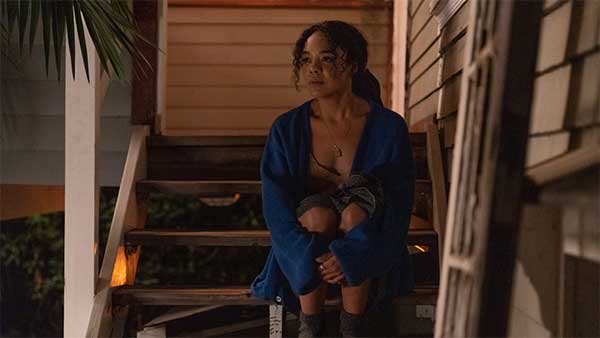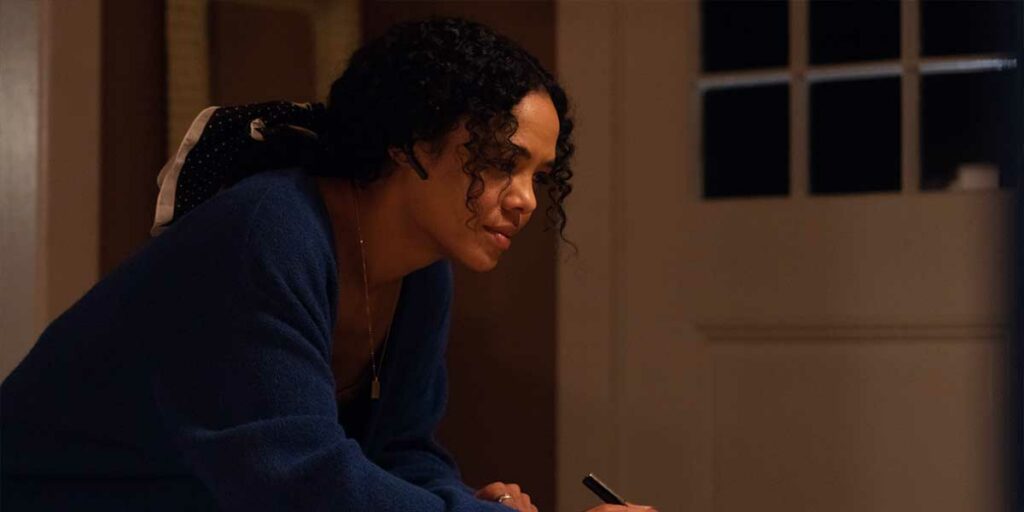Tessa Thompson delivers an emotionally mature performance as a mental health hotline worker in The Listener.
Before The Listener, Tessa Thompson was already one of my favorite actresses. She is the sole reason why I enjoyed Thor: Love and Thunder last year, and gave one of the most fascinating performances I’ve seen in the last decade in Passing. Now, Thompson can add Steve Buscemi’s latest film to her already impressive resume.
The Listener follows Beth (Thompson), who is a volunteer for a mental health hotline. On any given night, she can possibly deal with lonely, anxiety-stricken, or suicidal people and she can only use her words to try to help them as much as possible. During the course of this film, the audience stays with Beth on one of her night shifts, where she interacts with a large mix of people, giving us a peek into how important the people who are willing to do this job really are.
Even though The Listener is an exhausting watch, it’s an important film for two reasons. First, this film serves as a positive example of art inspired by the current times that we live in. During the initial lockdown for COVID, there was a large decline in people’s mental health. While The Listener doesn’t address this directly, it can be felt while watching it. As we listen to some of these phone calls, there is mention of the lockdown, but it all feels natural. The film is a product of the pandemic and utilizes the new circumstances the world was in to its advantage strengthening the story greatly.
I also feel this film is important due to how real it felt listening to everyone’s story. Over the course of The Listener, we get a wide variety of personalities with vastly different issues. Even if it wasn’t directly, I found at least two of these calls relatable and I believe that almost anyone who watches it would be able to relate to some as well. Any film that can potentially amplify feelings in a way that can make audiences feel seen or heard should be celebrated, and I believe The Listener can do that.

Moving on, since we are staying with Beth for almost every frame of The Listener, it makes the watch a little tiring. It is hard to only stay with one character, and while she is interacting with people, we only focus on her, which makes the film feel slow. Buscemi tries to make these conversations feel as dynamic as possible, having consistent camera movements and allowing Thompson to move around her house often, but by the time we reach the second half, it isn’t enough to keep it visually interesting. However, ASKA’s score makes each call feel unique, adding in music to help if a particular call is intense or sad which subtly adds to the entertainment value.
Tessa Thompson is great in The Listener: she is soft-spoken, yet speaks with such assurance. There are not a lot of actors who could have made an hour and a half of just them entertaining enough to sit through, but it is as if you’re in the room with her. One of the final calls she takes is with a sociology professor (Rebecca Hall, of Resurrection) whose reason for calling isn’t revealed for the first ten minutes we are with her. This conversation ends up being an extremely authentic depiction of mental health, but it could have easily come off as pretentious or forced without the dedication of both these actors.
The Listener is a film unlike anything I’ve seen before. Part pure showcase for Thompson’s acting abilities, part celebration of the dedication of mental health hotline volunteers, especially during the worst of the pandemic, this is a film that everyone should see. Listening to people who are going through the worst parts of their life is grueling and a tough task, but one that is at least worth a shot, at least to have a peak for the emotional labor it takes for these heroes to help others.
The Listener premiered at the Tribeca Film Festival on June 11, 2023 and will be released in US theaters on March 29, 2024.

